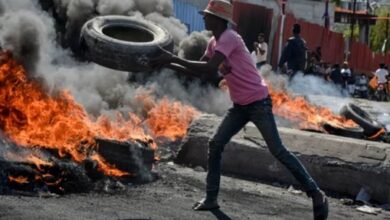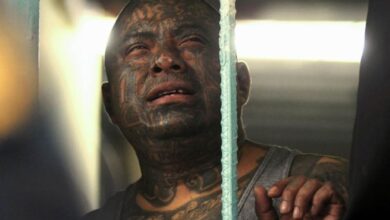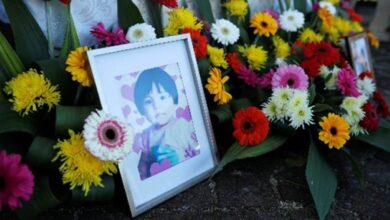Maras in El Salvador: Who is Nayib Bukele Facing?
Here we analyze who are the Maras of El Salvador that Nayib Bukele is facing..

Photo: TW-NayibBukele
LatinAmerican Post | Theoscar Mogollón González
Listen to this article
Leer en español: Maras en El Salvador: ¿A quiénes se enfrenta Nayib Bukele?
El Salvador was living for several months in almost perfect peace, to the point that the homicides that were part of everyday life almost disappeared from its statistics. However, in the blink of an eye, the Central American country was back in the spotlight for something negative: violence was once again returning to the streets. What happened and why did this wave of murders suddenly break out? Having no other choice, the president of the Salvadoran nation, Nayib Bukele, launched a crusade against the gangs in order to stop a possible "war."
According to local media reports, and supported by figures from the Statista portal, in March El Salvador suffered an exponential increase in homicides never before seen in the last 20 years. The country registered a total of 62 murders on the same day (March 26) a scenario not seen since the 1980s. Faced with such a situation, Bukele decreed a state of emergency for 30 days, extendable with the intention of counteracting this wave of violence initiated by the gangs.
However, this state of emergency has been postponed for another 30 days at the request of Bukele himself, who has arrested more than 16,000 suspected gang members to date, according to official state figures. Likewise, it is worth mentioning that the measures taken by the president have been criticized by different groups that defend human rights, including Unicef, since many of the people who have been detained are minors.
According to what Juan Carlos Torres, director of the Master's Degree in Policies for the Prevention of Youth Violence and Culture of Peace of the Don Bosco University of San Salvador , in an interview with the BBC, what motivated the outbreak of the past 26 March was an alleged breakdown in communication between the state and the gangs that caused everything to spiral out of control. Of course, the government denies that there was any kind of truce with gang members to keep the peace in El Salvador.
Nuestra @PNCSV y @FUERZARMADASV han superado las 20,000 capturas desde el inicio de la #GuerraContraPandillas
Hasta las 7pm de este día, el total de terroristas capturados es de 20,290, en solo 33 días.
Seguimos… pic.twitter.com/RJWg3TzFgk
— Nayib Bukele (@nayibbukele) April 28, 2022
What gangs is Bukele facing?
The reason for the uptick in homicides in El Salvador is nothing more than a way of calling attention to the political class by the gangs. "Homicides were increased to show the gang's discontent over any relationship with the government and also to put pressure on it," admits Torres, adding that the gang members' message is more than clear. At the same time, we cannot fail to mention that various criminal groups operate in the Central American country, some with more power than others, but all with the same objective.
The Mara Salvatrucha and Barrio 18 are the two main powers, and they benefit economically through extortion and drug trafficking. How was it that they obtained so much power and control in different areas of the country?
Also known as MS-13, the Mara Salvatrucha is the most recognized gang not only in El Salvador but also in other Central American countries, with the great detail that its origin comes from Los Angeles, United States. After the civil war that hit the country in the 80's, hundreds of Salvadoran refugees fled to North America, where over time they joined and formed urban gangs to defend themselves. This caused violence to increase in the poor neighborhoods of Los Angeles and forced the authorities to massively extradite these gang members.
You may also be interested in: What is Bukele Risking with His Anti-Violence Strategy in El Salvador?
In the 90's, finding a country devastated by the aforementioned civil war, the Mara Salvatrucha took control of the streets and began to recruit young people from poor families to train them to commit murders, kidnappings, and extortions. But their almost omnipresence not only goes hand in hand with violence, any other issue related to communities, such as transportation or basic services, is also related to them. In fact, according to an investigation by InSight Crime, the level of control is almost total to the point that people do not call the police to solve domestic disputes, but rather the Mara.
Along with them, Barrio 18 also had its unsustainable growth, another organization whose origins come from Los Angeles and with the difference that they were the first to accept members of other nationalities. However, starting in the 2000s, some internal problems forced the separation into two factions: Sureños and Revolucionarios. With all that, their criminal activities were practically the same: robbery, prostitution, arms and human trafficking, money laundering, contract killings and extortion, the latter being their most significant income.
In short, since 6,656 homicides were recorded in 2015, the highest figure in this century, the average has been falling little by little over the years. Since Bukele's arrival to the presidency in 2019, and after the implementation of the Territorial Control Plan project, the homicide rate fell to 1,140 at the end of 2021 , according to the National Civil Police of El Salvador. The outlook in the Central American country remains uncertain and many point to the possibility of more reprisals from the gangs, in addition to the fact that Bukele's measures to curb violence may not have an effect due to the structural power of these organizations due to the level of poverty. suffered by the country for decades.
Hasta hace poco, los pandilleros mostraban orgullosos sus tatuajes, les daba estatus, identidad, rango y les servían para atemorizar a sus víctimas.
Ahora se queman el cuerpo para tratar de ocultarlos…
De igual manera, irán a envejecer a la cárcel.
Sus delitos no prescriben. pic.twitter.com/oABPM3AxFq
— Nayib Bukele (@nayibbukele) April 27, 2022





